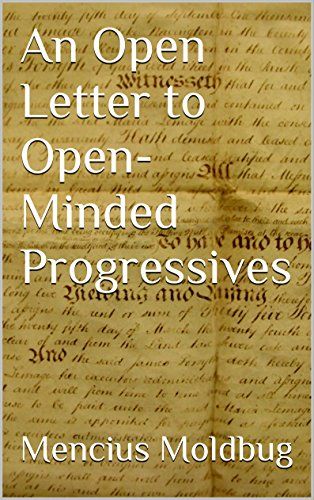An Open Letter Chapter 3 - The Jacobite History of the World

Full Title: Chapter 3: The Jacobite History of the World | An Open Letter to Open-Minded Progressives | Unqualified Reservations by Mencius Moldbug
Creator: Mencius Moldbug (Curtis Yarvin)
Publication Date: May 8, 2008
Link: Audio: An Open Letter to Open Minded Progressives - Chapter 3 - The Jacobite History of the World - YouTube
Summary:
Challenging the Assumptions of Progressivism
- Up to this point Moldbug/Yarvin has been challenging one particular basic assumption of progressives: that the post colonial establishment (and progressivism) has been a liberation and a blessing for all nations it has touched.
- In the second chapter especially, he gives a historical argument concerning the inconsistencies and contradictions in the narrative of “independence” and “national self-determinism” despite the apparent benevolence and intelligence of the progressives involved.
Examining the Question of History
- In Chapter 3, having explored a number of complications to the liberal historical narrative, he begins to turn towards the question of history as such.
- He gives two examples of journalists noticing challenges to their progressive model of history and shying away from considering their implications.
Defining Reactionary and Progressive Beliefs
- These words are at least somewhat useful over the course of “modern” history.
- He argues that while a similar system doesn’t really work for “music” and what counts as progressive vs reactionary there would be far more confused.
Reactionary
- What is a Reactionary: someone who believes in order, stability, and security; a “legitimist.”
- He admits that the “legitimate order” he believes in is arbitrary
- He rejects a theological or ecclesial understanding of legitimacy.
Progressive
- Progressives are not directly in opposition of tradition or order as such
- They are inheritors of a tradition of change dating to the Enlightenment
- They believe the world is progressing toward continual improvement over current affairs.
- Progressivism is justified by a vicious cycle (it is good because it succeeds and it succeeds because it is good).
- It is clear that they do at least have a near unbroken line of political successes to point to and suggests possible explanations for it such as Divine Providence and dialectical materialism before deciding to refer to it as W(Whig)-force.
The Role of the W-Force in Progressivism
- The W-force is a "mysterious" force that drives progress and change
- Moldbug considers and rejects a number of explanations for the W-force from within the progressive paradigm before giving a “reactionary reading” of the question.
- There is an ideological distance between progressives in the past and their heirs in our present and how many of their prophecies turned out to be untrue.
- Attempts to compromise with the forces of progressivism have failed in the past - modern conservatism is just another such attempt.
The Success of Reactionary Movements
- Reactionary movements have been and will be more successful by directly opposing progressivism altogether.
- Further, Fascism, aside from other moral questions, is not a practical solution because it required surviving elements of the ancien regime that no longer exist.
Progressivism, Power & Destruction
Ultimate conclusion about the conflict between progressivism & reaction:
- Progressives are not for chaos but they are always for the total liquidation of the present order, whatever it may happen to be, in order to create a better one.
- This process requires gaining a lot of power over the existing order and destroying its defenders therefore attracts people who like having power and destroying enemies.
- If it helps to actually improve the human condition along the way, it is only by accident.
- The W-force of progressivism is therefore entropy
- Stability and order inevitably decay and progressives thrive off of this process.
Tags:
#blog#nrx